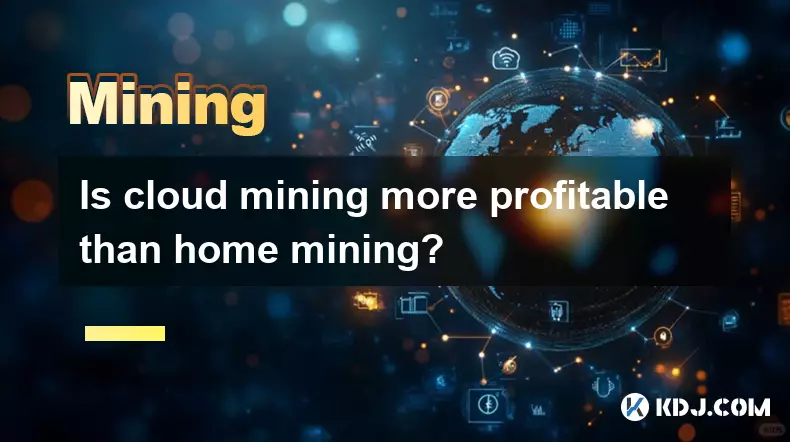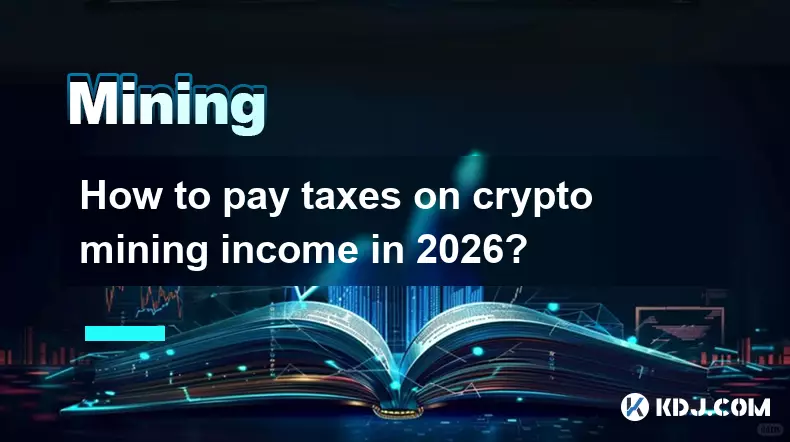-
 bitcoin
bitcoin $87959.907984 USD
1.34% -
 ethereum
ethereum $2920.497338 USD
3.04% -
 tether
tether $0.999775 USD
0.00% -
 xrp
xrp $2.237324 USD
8.12% -
 bnb
bnb $860.243768 USD
0.90% -
 solana
solana $138.089498 USD
5.43% -
 usd-coin
usd-coin $0.999807 USD
0.01% -
 tron
tron $0.272801 USD
-1.53% -
 dogecoin
dogecoin $0.150904 USD
2.96% -
 cardano
cardano $0.421635 USD
1.97% -
 hyperliquid
hyperliquid $32.152445 USD
2.23% -
 bitcoin-cash
bitcoin-cash $533.301069 USD
-1.94% -
 chainlink
chainlink $12.953417 USD
2.68% -
 unus-sed-leo
unus-sed-leo $9.535951 USD
0.73% -
 zcash
zcash $521.483386 USD
-2.87%
Is cloud mining more profitable than home mining?
Cloud mining offers convenience without hardware management, but home mining provides greater control and long-term profit potential in low-cost energy areas.
Nov 05, 2025 at 10:49 pm

Understanding the Basics of Cloud Mining and Home Mining
1. Cloud mining involves renting computing power from a remote data center to mine cryptocurrencies. Users pay a service provider to access hash power without managing physical hardware. This model eliminates the need for purchasing, maintaining, or cooling mining rigs.
2. Home mining requires individuals to buy and operate their own mining equipment, such as ASICs or GPUs, within their personal space. Miners are responsible for electricity costs, ventilation, noise management, and ongoing maintenance.
3. Both methods aim to validate blockchain transactions and earn cryptocurrency rewards. The primary difference lies in infrastructure ownership and operational control.
4. Cloud mining contracts vary in length and pricing models, often including daily fees or one-time payments for a set duration of hash rate usage. Transparency about uptime and actual performance can differ significantly between providers.
5. Home mining allows full control over operations, enabling optimization of settings, immediate troubleshooting, and flexibility in choosing which coins to mine based on profitability shifts.
Cost Structure and Financial Implications
1. Cloud mining services typically charge upfront fees for contracts and may include maintenance or electricity surcharges. These hidden costs can reduce net returns, especially if market prices fluctuate.
2. Home miners absorb initial capital expenses for hardware but gain long-term asset ownership. Over time, depreciation and efficiency losses occur, yet resale options exist even for outdated equipment.
3. Electricity is a major cost factor. In home mining, local energy rates directly impact profitability. Areas with high kWh prices diminish potential gains, whereas regions with subsidized or low-cost power enhance margins.
4. Cloud mining removes variable utility expenses from the user’s balance sheet, but this convenience comes at the expense of lower transparency and potentially inflated operating margins taken by providers.
5. Scalability differs drastically. Expanding a home mining setup demands additional space, circuit capacity, and cooling solutions. Cloud mining enables instant scaling through new contracts, though availability and pricing depend on market demand.
Risks and Reliability Concerns
1. The cloud mining industry has been plagued by fraudulent operators offering non-existent hardware or exaggerated returns. Due diligence is essential before committing funds to any platform.
2. Downtime, maintenance delays, and mismanagement at data centers can silently erode earnings. Users have limited recourse when performance metrics don’t match advertised levels.
3. Home mining risks include hardware failure, fire hazards from overheating devices, and theft. However, these issues remain under the miner’s direct oversight, allowing faster response times.
4. Regulatory changes affecting data centers or cross-border transactions can disrupt cloud mining operations. Jurisdictional instability adds another layer of uncertainty beyond the user's influence.
5. In contrast, home miners face fewer third-party dependencies but must comply with local zoning laws, electrical codes, and noise ordinances that could restrict operations.
Profitability Comparison Under Real-World Conditions
1. Short-term profitability favors cloud mining when entry barriers like high electricity costs or lack of technical knowledge prevent effective home setups.
2. Long-term calculations show that efficient home mining in low-energy-cost environments often yields higher cumulative returns despite maintenance efforts.
3. Market volatility impacts both models equally, but cloud mining lacks adaptability. Contracts usually lock users into specific algorithms or coins, preventing quick switches during sudden profit shifts.
4. Home mining offers strategic advantages during bull markets, where upgraded firmware, overclocking, and pool-hopping techniques maximize output relative to static cloud-based allocations.
5. Depreciation of mining hardware affects both approaches differently. In cloud mining, obsolescence is managed (or ignored) by the provider, while home miners can repurpose or sell components before complete value loss.
Frequently Asked Questions
What happens when a cloud mining contract expires?After expiration, mining rights cease unless renewed. No residual value or equipment ownership transfers to the user. Earnings stop immediately post-contract unless extended.
Can home mining be done profitably with consumer-grade GPUs?Yes, under favorable conditions such as low electricity rates and selection of GPU-mineable coins with strong network incentives. Profitability fluctuates with coin difficulty and market price swings.
Are there tax implications unique to cloud mining?Tax treatment depends on jurisdiction, but income from cloud mining is generally treated as taxable revenue similar to other mining activities. Record-keeping of payouts and fees is critical for compliance.
Disclaimer:info@kdj.com
The information provided is not trading advice. kdj.com does not assume any responsibility for any investments made based on the information provided in this article. Cryptocurrencies are highly volatile and it is highly recommended that you invest with caution after thorough research!
If you believe that the content used on this website infringes your copyright, please contact us immediately (info@kdj.com) and we will delete it promptly.
- Pepe Coin Takes a Tumultuous Turn: Decoding Volatility and Shifting Market Sentiment
- 2026-02-09 03:50:02
- Wintermute CEO Dismisses Crypto Collapse Rumors Amidst Market Volatility
- 2026-02-09 01:45:01
- Trump's Crypto Tango: White House Talks Ignite BTC & PKR Markets
- 2026-02-09 01:40:01
- Ethereum's Volatility: Navigating Longs Amidst WAGMI Hopes and Technical Upgrades
- 2026-02-09 01:35:02
- Web3, RWA, and the Regulatory Reckoning: Charting a Course for Compliant Innovation
- 2026-02-09 01:30:01
- Super Bowl Coin Toss: Decoding the Flip, Betting Tips, and a Historic Twist for the Big Game
- 2026-02-09 01:25:01
Related knowledge

How to mine crypto sustainably in 2026?
Feb 07,2026 at 04:20pm
Energy Source Optimization1. Miners increasingly deploy solar arrays directly on warehouse rooftops to power ASIC rigs during daylight hours. 2. Geoth...

How to mine Conflux on a standard gaming laptop?
Feb 07,2026 at 04:19am
Hardware Requirements for Conflux Mining1. Conflux uses a proof-of-work consensus mechanism called Tree-Graph, which is designed to be ASIC-resistant ...

How to buy hashing power on cloud mining platforms?
Feb 08,2026 at 05:59pm
Understanding Cloud Mining Contracts1. Cloud mining platforms offer users the ability to rent hashing power without owning or maintaining physical har...

How to mine Flux with a 30-series Nvidia GPU?
Feb 07,2026 at 02:40pm
Market Volatility Patterns1. Bitcoin price movements often exhibit sharp intraday swings exceeding 5% during low-liquidity windows, particularly betwe...

How to pay taxes on crypto mining income in 2026?
Feb 07,2026 at 01:20am
Tax Classification of Mining Rewards1. Cryptocurrency received as mining rewards is treated as ordinary income by most major tax jurisdictions includi...

How to find the lowest fee mining pools for BTC?
Feb 07,2026 at 01:00pm
Fee Structure Transparency1. Most reputable BTC mining pools publish their fee schedules directly on their official websites, often under sections lab...

How to mine crypto sustainably in 2026?
Feb 07,2026 at 04:20pm
Energy Source Optimization1. Miners increasingly deploy solar arrays directly on warehouse rooftops to power ASIC rigs during daylight hours. 2. Geoth...

How to mine Conflux on a standard gaming laptop?
Feb 07,2026 at 04:19am
Hardware Requirements for Conflux Mining1. Conflux uses a proof-of-work consensus mechanism called Tree-Graph, which is designed to be ASIC-resistant ...

How to buy hashing power on cloud mining platforms?
Feb 08,2026 at 05:59pm
Understanding Cloud Mining Contracts1. Cloud mining platforms offer users the ability to rent hashing power without owning or maintaining physical har...

How to mine Flux with a 30-series Nvidia GPU?
Feb 07,2026 at 02:40pm
Market Volatility Patterns1. Bitcoin price movements often exhibit sharp intraday swings exceeding 5% during low-liquidity windows, particularly betwe...

How to pay taxes on crypto mining income in 2026?
Feb 07,2026 at 01:20am
Tax Classification of Mining Rewards1. Cryptocurrency received as mining rewards is treated as ordinary income by most major tax jurisdictions includi...

How to find the lowest fee mining pools for BTC?
Feb 07,2026 at 01:00pm
Fee Structure Transparency1. Most reputable BTC mining pools publish their fee schedules directly on their official websites, often under sections lab...
See all articles





















![Is This a REAL Reversal or Fake out?? I wouldn't Get Excited Just Yet... [20 Min emergency stream] Is This a REAL Reversal or Fake out?? I wouldn't Get Excited Just Yet... [20 Min emergency stream]](/uploads/2026/02/08/cryptocurrencies-news/videos/origin_698897450a654_image_500_375.webp)


![Mesocosmos (By Biskotos) [All Coins] | Geometry Dash Mesocosmos (By Biskotos) [All Coins] | Geometry Dash](/uploads/2026/02/08/cryptocurrencies-news/videos/origin_69889be2eac64_image_500_375.webp)

















































